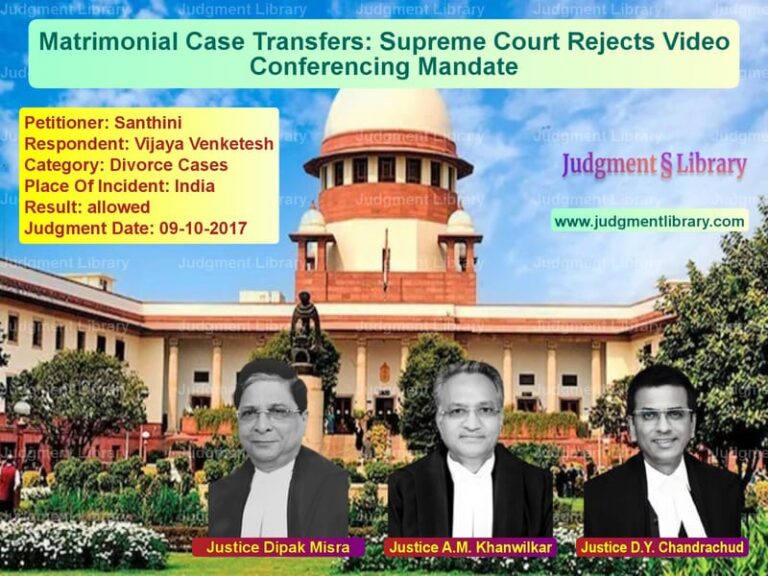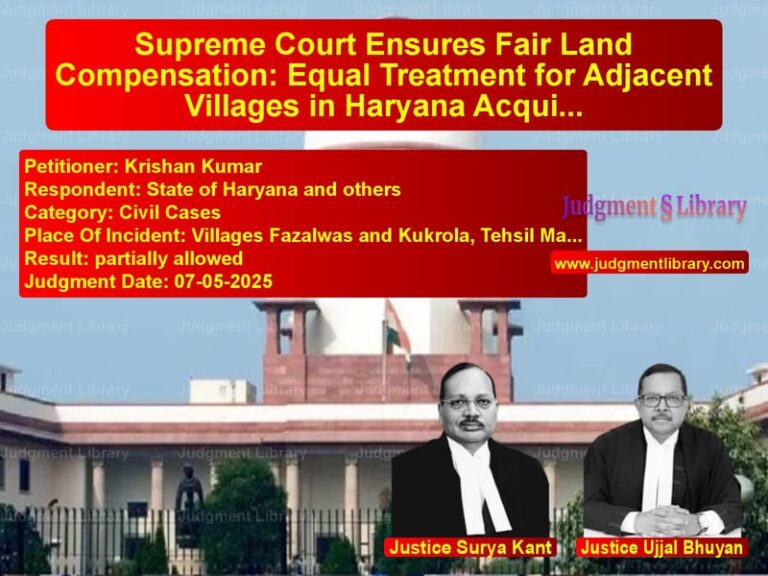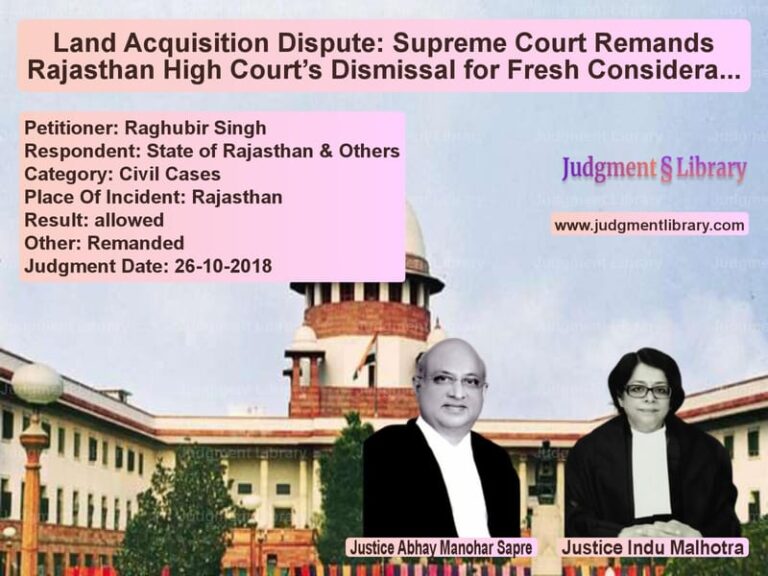Land Acquisition Dispute: Greater Noida Industrial Development Authority vs. Savitri Mohan & Ors.
The case of Greater Noida Industrial Development Authority vs. Savitri Mohan & Ors. revolves around a land acquisition dispute where the Supreme Court examined the validity of invoking the urgency clause under the Land Acquisition Act, 1894. The judgment primarily focused on whether the invocation of the urgency clause was justified and what relief the landowners were entitled to.
The Supreme Court ruled in favor of the landowners by setting aside the acquisition notification but balancing the interests of development by granting additional compensation and allotment of developed land.
Background of the Case
The dispute arose when the Greater Noida Industrial Development Authority (GNIDA) issued notifications under Section 4(1) and Section 17(4) of the Land Acquisition Act, 1894, on March 12, 2008, acquiring land for planned industrial development. This was followed by another notification on February 3, 2009, under Section 6 read with Section 17(1) of the Act.
The landowners challenged the acquisition, arguing that the urgency clause had been wrongly invoked, depriving them of their right to object. They had already filed a petition in the High Court of Allahabad on March 3, 2009, stating that the acquisition was arbitrary and unjustified. They also contended that they were engaged in floriculture and hybrid seed production, making the land unsuitable for industrial purposes.
Key Legal Issues
- Whether the invocation of the urgency clause under Sections 4 and 17 of the Land Acquisition Act was justified.
- Whether the landowners were entitled to relief despite substantial development on the acquired land.
- The application of precedent judgments regarding land acquisition and compensation.
Arguments by the Parties
Petitioner’s (GNIDA’s) Arguments
- The land acquisition was necessary for rapid industrial development.
- There was a threat of illegal encroachments and unauthorized construction, justifying the urgency clause.
- Public infrastructure, including roads, sewage systems, and electricity, had already been developed on the acquired land.
- Over 76% of the compensation had already been disbursed to landowners.
- The acquisition should not be quashed, but relief could be granted in the form of additional compensation.
Respondent’s (Savitri Mohan & Ors.) Arguments
- The invocation of the urgency clause was arbitrary and unjustified.
- Their right to object under Section 5A was violated.
- Possession of the land was wrongly shown as taken when there was an interim order staying the acquisition.
- The land was being used for agricultural and industrial purposes, making its acquisition unnecessary.
- Similar acquisitions had been set aside by the Supreme Court in other cases.
High Court’s Ruling
The Allahabad High Court ruled in favor of the landowners, setting aside the acquisition notifications, stating:
“The power to dispense with inquiry under Section 5A should be exercised in exceptional circumstances and not without real urgency.”
The High Court held that the urgency clause had been wrongly applied and that the landowners had been deprived of their legal rights.
Supreme Court’s Judgment
The Supreme Court overturned the High Court’s decision, ruling that:
“Despite the finding that invocation of urgency clause was uncalled for, the relief of setting aside the acquisition was not granted having regard to the development that had already undertaken on substantial part of the land.”
Key Observations by the Court
- The case was similar to Savitri Devi vs. State of Uttar Pradesh, where relief was granted in the form of increased compensation instead of quashing the acquisition.
- The Full Bench ruling in Gajraj & Ors. vs. State of U.P. had upheld similar acquisitions but awarded additional compensation.
- Substantial development had already taken place, and quashing the acquisition would disrupt public projects.
- Landowners were entitled to higher compensation and alternative land allotments.
Final Judgment
The Supreme Court ruled:
- The acquisition notifications were upheld, but additional compensation was to be awarded.
- Landowners would receive a 64.7% increase in compensation.
- They would also be allotted developed residential plots amounting to 10% of the acquired land, with a maximum cap of 2500 square meters.
- The landowners retained the right to claim further compensation under the Land Acquisition Act.
Conclusion and Legal Impact
This ruling reinforces several key legal principles:
- Urgency clauses must be used sparingly, and landowners must be given a fair chance to present objections.
- Where substantial development has taken place, land acquisitions should not be quashed entirely.
- Additional compensation is an appropriate remedy in cases where landowners have been deprived of their rights under Section 5A.
- Infrastructure projects serve the public interest and must be balanced against individual property rights.
The Supreme Court’s decision ensures that urban and industrial development continues while protecting landowners’ rights through fair compensation.
Judgment delivered by: Adarsh Kumar Goel, Anil R. Dave
Judgment Date: June 29, 2016
The ruling establishes a precedent in land acquisition cases, ensuring that both development and individual property rights are balanced fairly.
Don’t miss out on the full details! Download the complete judgment in PDF format below and gain valuable insights instantly!
Download Judgment: Greater Noida Indust vs Savitri Mohan & Ors. Supreme Court of India Judgment Dated 29-06-2016-1741872455641.pdf
Direct Downlaod Judgment: Direct downlaod this Judgment
See all petitions in Property Disputes
See all petitions in Landlord-Tenant Disputes
See all petitions in Damages and Compensation
See all petitions in Judgment by Adarsh Kumar Goel
See all petitions in Judgment by Anil R. Dave
See all petitions in partially allowed
See all petitions in Modified
See all petitions in supreme court of India judgments June 2016
See all petitions in 2016 judgments
See all posts in Civil Cases Category
See all allowed petitions in Civil Cases Category
See all Dismissed petitions in Civil Cases Category
See all partially allowed petitions in Civil Cases Category







